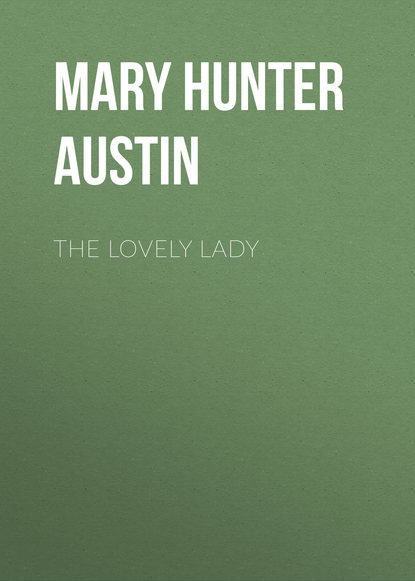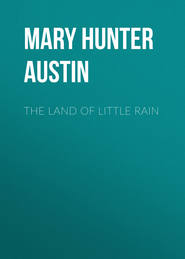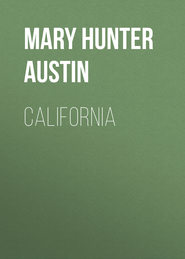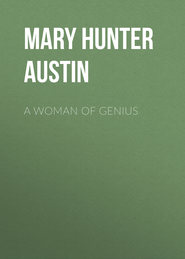По всем вопросам обращайтесь на: info@litportal.ru
(©) 2003-2024.
✖
The Lovely Lady
Настройки чтения
Размер шрифта
Высота строк
Поля
"And that is–"
"A woman of your own … understanding and care … and children. I was in the church with you … you saw–"
"But I don't want to talk about it."
"What do you want then?"
"To be the prince in a fairy tale, I suppose," Peter sighed.
"Oh, you're all of that to her. The half god—the unmatched wonder. When she watched your coming across the water this morning—I know the look that should go to a slayer of dragons. It seems to me," said the Princess severely, "it is you who are running away."
She was wise enough to leave him with that view of it though it was not by any means leaving him more comfortable. He tried for relief to figure himself as by the Princess' suggestion, he must seem to Savilla Dassonville. But if he was really such to her why could he not then play the Deliverer in fact, rescue her from untended illness, from meagreness and waste? Why not, in short, marry her, except for a reason—oh, there was reason enough if he could only remember it!
He heard Luigi moving softly in the room behind, and presently when the door clicked he rose and went in and taking the lamp held it high over him, turning with it fronting the huge mirror in its gilded frame. If there were a good reason why he couldn't marry Savilla Dassonville, he ought to have found it in his own lean frame, the face more drawn than was justified by his years, lined about the eyes, the hand that held the accusing lamp broadened by labours that no scrupulosity of care denied. Weatheral, of Weatheral, Lessing & Co., unaccomplished, unaccustomed. He put down the lamp heavily, leaning forward in his chair as he covered his face with his hands and groaned in them, fully remembering.
X
He had been sitting just so in his library with the lamp behind him and the hollow flare of the coals making an excellent starting place for the House which was now so near him that the mere exhibition in shop windows of the stuffs with which it was being modernly renewed, was enough to set him off for it. It was so near now, that since the announcement of their engagement in September, he had moved through all its obligations benumbed by the white, blinding flash thrown backward from its consummating moment, the moment of her cry to him, of their welding at the core of light and harmony, bounded inevitably by the approaching date of marriage. It had been, he recalled on some one of those occasions of social approval by which it appeared engagements in the Best Society proceeded, that he had sat thus, waiting until the clock ticked on the moment when he might properly join her, sat so full of the sense of her that for the instant he accepted her unannounced appearance at the darkened doorway as the mere extension of his white-heated fancy. The next moment as she charged into the circle of the lamp he saw that the umbra of some strange electrical excitement hung about her. It fairly crackled between them as he rose hurriedly to his feet.
"You have come, Eunice! You have come–"
But he saw well enough what she had come for. She laid the case on the table, but as she tugged impatiently at her glove, the fringe of her wrap caught the clasp of it and scattered the jewels on the cloth. She tried then to put the ring beside them, but her hand shook so that it fell and rolled upon the floor behind them. Peter picked it up quietly, but he did not offer it to her hand again.
"I have come," said Eunice, "to say what in my mother's house I was afraid of being interrupted in saying; what you must see, what my mother won't see."
"I see you are greatly excited about something!"
"I'm not, I'm not.... That is … I am, but not in the way you think," she was sharp with insistence; "that is what you and mother always say, that I'm nervous or excited, and all the time you don't see."
"What is it I don't see, Eunice?"
"That I can't stand it, that I can't go on with it, that it is dreadful to me,—dreadful!"
"What is dreadful?"
"Everything, being engaged—being married and giving up...." It was fairly racked out of her by some inward torture to which he had not the key.
"Of course, Eunice, if you don't wish to be married so soon–" Peter was all at sea. He brought a chair for her, and perceiving that he would go on standing as long as she did, she sat upon the edge of it but kept both the arms as a measure of defence. The slight act of doing something for her restored him for the moment to reality; he bent over her. "I've never wanted to hurry you, dearest– It shall be when you say." She put up her hands suddenly with a shivering movement.
"Oh, never, never at all; never to you!"
Peter could feel that working its track of desolation inward, but the first instinctive movement of his surface was to close over the wound. He took it as he knew he could only take it: as the explosive crisis of the virginal resistance which he remembered he had heard came to girls when marriage loomed upon them. He took a turn down the room to steady himself, praying dumbly for the right word.
"It isn't as if I didn't respect you"—she was eager in explanation, hurried and stumbling—"as if I didn't know how good you are … it is only, because we are so different."
"How different, Eunice?"
"Oh … older, I suppose." She grew quieter; it appeared on the whole they were getting on. "I care for so many things, you know—dancing—and bridge—young things—and you are always reading and reading. Oh! I couldn't stand it."
So it was out now. She was jealous of his books, a little. Well, he had been self-absorbed. It occurred to him dimly that the thing to have done if he had known a little more about women, had practised with them, was to have provoked her at this point to the tears which should have sealed the renewal of his claim to her. What he said was, very quietly:
"Of course I never meant, Eunice, that you shouldn't have everything you want."
"Oh," she seemed to have found a suffocating quality in his gentleness, against which she struck out with drowning gestures, "if you could only understand what it would mean to me never to have anybody I liked to talk to about things,—anybody I liked to be with all the time!" She was choked and aghast at the enormity of it.
"But I thought...." Peter was not able to go on with that. "Isn't there anybody you like to be with, Eunice?"
"Yes," said Eunice. "Burton Henderson."
Mutinous and bright she looked at him out of the chair with a hand on either arm of it poised for flight or defence. After an interval Peter heard his own voice out of a fog rising to the conventional utterance.
"Of course, if you have learned to love him–"
"I've loved him all the time." She was so bent on making this clear to him that she was careless what went down before her. "From the very beginning," she said, "but he had so little money, and mother … I promised you, I know, but it's not as if I ever said I loved you."
She should have spared him that! He had not put out a hand to hold her that he should be so pierced through with needless cruelty. But she was bent on clearing her skirts of him.
"Do you think," she expostulated to his stricken silence, "that if I'd cared in the least I'd have made it so easy for you? Can't you see that it was all arranged, that we jumped at you?" All the time she sat opposite him, thrusting swift and hard, there was no diminution of her appealing beauty, the flaming rose of her cheeks and the soft, dark flare of her hair. As if she felt how it belied at every turn the quality of her unyielding intention, her voice railed against him feverishly. "I suppose you think I'm mercenary, and I thought I was, too. You don't know how people like us need money sometimes. All the things we like cost so—all the real things. And poor mamma, she needed things; she'd never had them, and I thought that I could stand being married to you if I could get them that way.... Maybe I could, you know, if you'd been different, more like us I mean. But there was such a lot you didn't understand … things you hadn't even heard about. I found that out as soon as we were engaged. There wasn't a thing between us; not a thing."
It poured scalding hot on Peter's sensitive surfaces: made sensitive by the way in which even in this hour her beauty moved him. He felt tears starting in his heart and prayed they might not come to his face. "So you see as we hadn't anything in common it would be better for us not to go on with it even"—she broke a little at this—"even if there hadn't been anybody else. You see that, don't you?" She dared him to deny it rather than begged the concession of him as she gathered herself for departure.
"I see that."
"You never really belonged to our set, you know–" She rose now and he rose blindly with her; he hoped that she was done, but there was something still. "It hasn't been easy to go through with it.... Mother isn't going to make it any easier. It's natural for her to want me to have everything that money would mean, and I thought that if you would just keep away from her … you owe something to Burton and me for what we've been through, I think … just leave it to me to manage in my own way...."
"I shall never trouble you, Eunice."
He came close to her then to open the door, seeing that she was to leave him, and he saw too that she had suffered, was at the very ebb and stony bottom of emotion as she hung for the moment in the doorway searching for some winged shaft of separation that should cut her off from the remotest implication of the situation. She found at last the barbedest. All the succeeding time after he closed the door on her was marked for Peter, not by the ticked moments but by successive waves of anguish as that poisoned arrow worked its way to his secret places.
"It isn't as if I had ever loved you; I owe it to Mr. Henderson to remind you that I never said I did.... You know I never liked to have you kiss me."
He had in the months that succeeded to that last sight of Eunice Goodward, moments of unbearably wanting to go to her to try for a little to ease his torment in a more tender recognition of it—days when he would have taken from her, gratefully even if she had fooled him and he had seen her do it, whatever would have saved him from the certainty that never even in those first exquisite moments had she been his. The sharp edge of her young sufficiency had lopped off the right limb of his manhood. Never, even in his dreams, if life had allowed him to dream again, should he be able to see himself in any other guise than the meagre, austere front which his obligation to his mother and Ellen had obliged him to present to destiny. She had beggared him of all those aptitudes for passionate relations, by the faith in which he had kept himself inwardly alive. The capacity for loving died in him with the knowledge of not being able to be loved.
Out of the anæsthesia of exhaustion from which Italy had revived him, it rolled back upon him that by just the walled imperviousness that shut Eunice Goodward from the appreciation of his passion, he was prevented now from Savilla Dassonville.
XI
It was odd, then, having come to this conclusion in the middle of the night, that when he joined the ladies in the morning he should have experienced a sinking pang in not being able any longer to be sure what Miss Dassonville thought of him. There was in her manner, as she thanked him for the flowers, nothing to ruffle the surface of the bright, impersonal companionship which she had afforded him for weeks past.
The occasion which brought them together was an agreement entered into some days earlier, to go and look at palaces, and as they turned past the Saluti to the Grand Canal, he found himself wondering if there had not been a touch of fatuity in his reading of the incident of the morning before. He had gone so far in the night as to think even of leaving Venice, and saw himself now forlornly wishing for some renewal of yesterday's mood to excuse him from the caddishness that such a flight implied.
It came out a little later, perhaps, when after traversing many high and resounding marble halls, with a great many rooms opening into one another in a way that suggested rather the avoidance of privacy than its security, they found themselves in one of those gardens of shut delight of which the exteriors of Venetian houses give so little intimation.
As she went about from bough to bough of the neglected roses, turned all inward as if they took their florescence from that still lighted human passion which had found its release and centre there, her face glowed for the moment with the colour of her quick sympathies. She turned it on him with an unconscious, tender confidence, which not to meet seemed to Peter, in that gentle enclosure full of warmth and fragrance, to assume the proportions of a betrayal.
He did meet it there as she came back to him for the last look from the marble balustrade by which they had descended, covering her hand, there resting, lingeringly with his own. He was awakened only to the implication of this movement by the discovery that she had deeply and exquisitely blushed.
It was a further singularity in view of the conviction with which Peter had come through the night, that the mood of protectingness which the girl provoked in him should have multiplied itself in pointing out to him how many ways, if he had not made up his mind not to marry her at all, such a marriage could be made to serve its primal uses. She had turned up her cuff to trail her hand overside as they slid through the lucent water, and the pretty feminine curve of it had brought to mind what the Princess had told him of the shirt-waists she made herself. He decided that she made them very well. But she was too thin for their severity—and if he married her he would have insisted on her wearing them now and then as a tender way to prevent her suspecting that it was on their account he had thought of not marrying her. The revealed whiteness of her wrist, the intimacy of her relaxed posture, for though her mind had played into his as freely as a child in a meadow, she had been always, as regards her person, a little prim with him, had lent to their errand of house visiting a personal note in which it was absurdly apt for them to have run across Captain Dunham of the Merrythought at the door of the Consulate. Mr. Weatheral had some papers which Lessing had sent him to acknowledge there, and it was a piece of the morning's performance, when he had come back from that business, to find that the meeting had taken on—from some mutual discovery of the captain's and Mrs. Merrithew's of a cousin's wife's sister who had married one of the Applegates who was a Dunham on the mother's side—quite the aspect of a family party. It came in the end to the four of them going off at Peter's invitation to have lunch together in a café overhanging the calle. He told himself afterward that he would not have done it if he had recalled in time the friendly seaman's romantic appreciation of the situation between himself and Miss Dassonville. He saw himself so intrigued by it that, by the time lunch was over, he felt himself in a position which to his own sensitiveness, demanded that he must immediately leave Venice or propose to Miss Dassonville. To see the way he was going and to go on in it, had for him the fascination of the abyss. He caught himself in the act even of trying to fix Miss Dassonville's eye to include her by complicity in the beguilement of the captain, a business which she seemed to have undertaken on her own account on quite other grounds. He perceived with a kind of pride for her that she had the ways of elderly sea-going gentlemen by heart. It was something even if she had failed to charm Peter, that she shouldn't be found quite wanting in it by other men.










